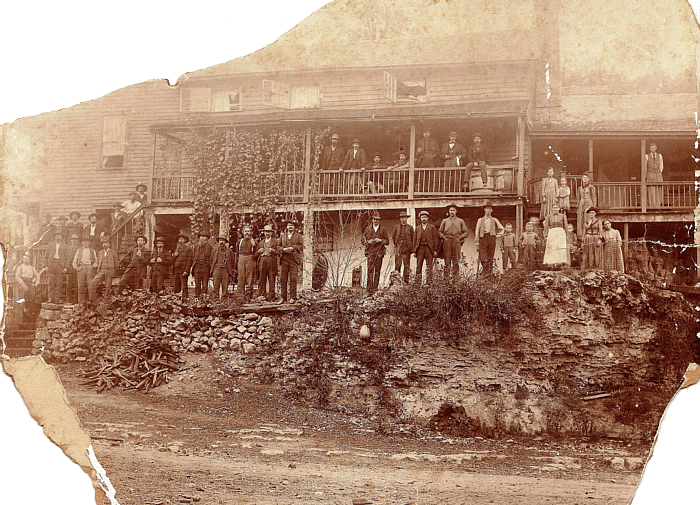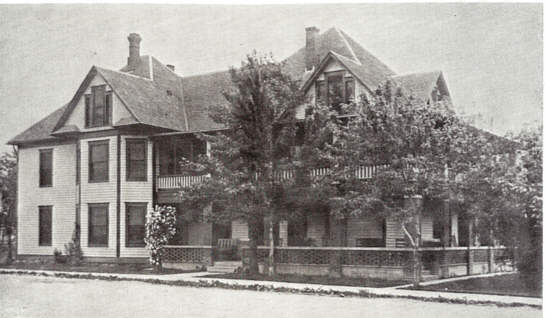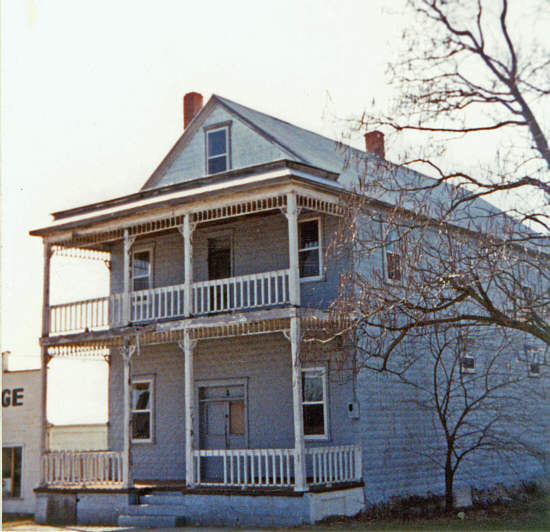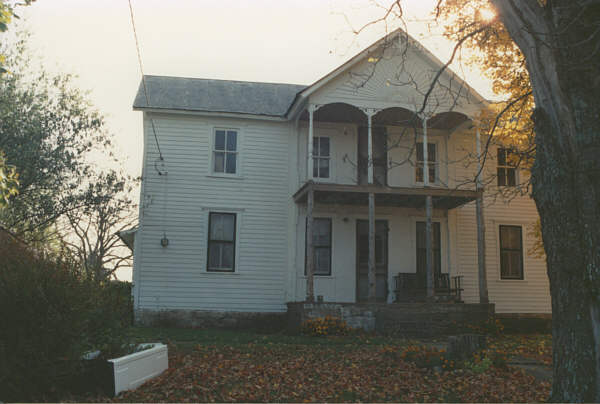
Miller County Hotels
BROCKMAN HOTEL
TUSCUMBIA LANDMARK RAZED
A Tuscumbia landmark, the building familiarly known as the old Brockman Hotel, was being razed this week.
A Tuscumbia landmark of Pre-Civil War vintage, now commonly referred to as the Old Brockman Hotel, formerly called the Home Hotel, and even earlier as Central Hotel, is coming down. Cecil Apperson is in charge of the wrecking procedure.
The family of the late Mr. and Mrs. J. N. Brockman moved there in 1913 when it was purchased by Mrs. Brockman, who ran a hotel there as long as she was able before her death in April, 1952. Mr. Brockman continued to live there until his death in 1959. During the later years of his life and since that time, it was rented as furnished apartments. For the last several years only the basement, housing a self-help laundry, has been used while the porches and other parts of the building have deteriorated.
C.O. Brockman, youngest of the J.N. Brockman sons, and the only one of the family still living in Tuscumbia, is the present owner. When asked about the history of the building, Brockman said he could only account for it since their family moved to Tuscumbia in 1905. It was then occupied by the Ludwell Bacon family. Mr. Bacon, he recalled, died there in 1906.
The building was painted a deep barn red when the Brockmans moved there. Mrs. Brockman had it painted white with cocoa trim, and later all white. Abstracts and other papers show that Mrs. Brockman often made payments on the property of as little as $10.
The building had 13 rooms, a washroom, and a full basement. The ground level basement was used as kitchen and dining room. The family ate after the guests had finished. Seven sleeping rooms were on the top floor and the lobby and ladies' guest room on the main first floor were also used by the hotel guests. All rooms were frequently filled, especially during court weeks.
There was no electricity or running water in those days, however, Brockman recalls that his mother had a lavatory put in the hall, using water from a ten gallon stone jar, which the boys filled every morning, so the guests could wash up as the come in and before meals. Meals were 35 cents, and later raised to 50 cents, Brockman remembers, although he doesn't believe the price was ever more than $1 for a bed.
Clyde Lee Jenkins in his historical study of the town lists this and two other hotels to accommodate the public around 1885. Amanda Adcock was proprietress of the Central Hotel (this one); Editha Freeman, proprietress of the Tuscumbia House which was directly across the street; and Benjamin Lawson, proprietor of the hotel on the river bluff. Other business places listed at that time include two general stores, four saloons, and two blacksmith and wagon shops.
One of the old stories concerning the building, although not completely authenticated, concerns a man who was either killed or committed suicide in one of the upstairs rooms. Another concerns a "drummer" who took down with smallpox there and the place was strictly quarantined for some time. Others who had been with the man or been exposed were taken to a place a few miles outside of town and required to stay there, it is said, until it was sure none would take the dreaded disease.
During the "horse and buggy" days, the hotel business thrived when the traveling salesmen, school teacher who came to the county seat for teachers examinations or teachers meetings, lawyers, and others involved in court cases as well as interested spectators, and many other business people and travelers often stayed overnight at the "hub".
-article from an old newspaper clipping
 Old Tuscumbia Hotel
VAUGHAN HOTEL
 Josie Vaughan Located across the street from Hauenstein's Store in Tuscumbia Goose Bottoms.
This is the owner, Josie Vaughan.
BURRIS HOTEL IN ELDON INSPIRED
"PETTICOAT JUNCTION" TV SERIES.....
By Peggy Smith Hake
At the turn of the 20th century, the Burris Hotel, once called the Rock Island Hotel), was a hustling, bustling hotel in Eldon, located near the railroad tracks of the Rock Island Line. Willis Burris (born 1854) and Martha Bowlin (born 1862) operated this popular hotel. They married in Miller County circa 1879.
Their nine children spent many happy days there as they grew up keeping watch on the daily trains and passengers who were transported across Missouri with stops in Eldon.
The children included:
1. Alice Elizabeth Burris b. Oct 1883 m. Benjamin Barth
2. Delaney R. Burris b. Sep 1887
3. Opal A. Burris b. Oct 1889
4. Otis E. Burris b. Jan 1892
5. Anna E. Burris b. Feb 1894
6. Wallace M. Burris b. Apr 1899
3 other children were born after 1900
Willis and Martha had lived in the Osage River country near Tuscumbia for a number of years but decided to move to Saline Township after their children were older. They operated three different hotels in Eldon over a period of years. One was the Godfrey Hotel at Second and Maple Streets; the Burris Hotel No. One at Mill Street and Old Highway 52; and the Rock Island/Burris Hotel near the railroad depot.
One of their daughters, Alice Elizabeth, grew up experiencing the hotel life in a small railroad town of Central Missouri. When Alice was grown, she moved to St. Louis where she met and married Benjamin Barth in 1908. Alice and Benjamin had a daughter, Ruth Margaret. As a young woman, Ruth moved to the Kansas City area and was employed by KMBC Radio. While there, Ruth met and married a young man from Independence, Missouri named Paul Henning. The couple moved to the west coast in later years and Paul became involved in script writing for the movies and later for television.
In the 1960s, Paul Henning was inspired to write the television series called "Petticoat Junction", a down-home, popular series that American audiences loved. Paul's 'Shady Rest Hotel' in the show was patterned after the hotel owned by Ruth's grandparents, the Burris/Rock Island Hotel in Eldon, Missouri.
Her mother, Alice Elizabeth Burris-Barth, had related so many wonderful stories of her life growing up in a small town near the Rock Island Line. Paul Henning, being a talented writer, brought his mother-in-law's memories to life and shared them with America. Paul and Ruth's daughter Linda Kaye Henning, the great granddaughter of Willis and Martha (Bowlin) Burris, portrayed one of the TV daughters in the "Petticoat Junction" series near the mythical town of Hooterville and greeted the daily train called the Cannonball which made trips through the town each day.
When Benjamin and Alice (Burris) Barth died, they were brought back home and buried in the Burris family cemetery plot in the Tuscumbia Cemetery. There are four generations of the Burris family there. The progenitor of this old Miller County family was Mastin Burris and his wife, Elizabeth. When Mastin died in 1844, he was placed in the family plot that was known as the Burris Family Cemetery located in the southeast corner of today's Tuscumbia Cemetery. Mastin's son, Miles Burris, had bought two town lots on the hill at Tuscumbia before 1844 from Isaac Goodrich for a family burial ground. Paul and Ruth (Barth) Henning had a rock wall erected around the gravesites of Ruth's ancestors after her mother's death in 1969.
Ruth Margaret (Barth) Henning died in 2002 and was placed at Tuscumbia Cemetery with her other family members. Her husband, Paul Henning, lived until 2005 and was also brought back to Miller County for burial. They were survived by 3 children: Carol Alice Henning, Linda Kaye Henning, and Paul Anthony Henning.
The old Burris Hotel, sitting for many years beside the Rock Island railroad in Eldon was torn down a few years ago, but the memories live on in each re-run of the "Petticoat Junction" television show.
NOTE: Paul Henning also wrote and produced 2 other popular shows for television including "The Beverly Hillbillies" and "Green Acres". The American audiences loved these down-home, small town shows and they can still be seen in re-runs on cable television networks.
ELDON HOTELS
From "Eldon, a Look Back"
The first hotels in town included the Cottage, later known as the James House, owned by Hattie James; the Goss House, owned by J. Goss (the building still stands on the east side of Maple Street next to the tracks); the Eldon Hotel, owned by John Brickney who later sold it to J. Godfrey (later known as the Godfrey Hotel); the City Hotel owned by J. Morris.
 The Cottage House Hotel Mr. and Mrs. George Hickok tell the story of "Battle Creek." The story goes that the Cottage Hotel was located on the east side of Maple near Third Street, just southwest of the depot and the Godfrey Hotel was where the Century Grill is now on Second Street. A creek ran down Third Street. The people in Eldon called the creek "Battle Creek" because Hattie James and Mrs. Godfrey were constantly bickering and competing for the business of the many peddlers who frequented town.
Peddling was quite a popular occupation in those days and everyone wanted a piece of the action. Hotel owners would buy goods on consignment from peddlers then sell them for a profit. The next time the peddler came through town the hotel proprietor simply sold back the goods they were not able to sell.
THE MARTIN HOTEL, BRUMLEY
By Lucille Crane
Around the turn of the century Clark Martin bought a small building and enlarged it to become the sixteen-room Martin Hotel in the heart of Brumley. After Clark's death his son Perry and family continued to operate a flourishing business. The clientele consisted mostly of "drummers" (traveling salesmen), and mule buyers. Occasionally, a horse-drawn taxi would bring a patron from the railroad station in Crocker, a day's journey away.
In addition to providing comforts for their guests, the Martin family had a well equipped livery stable for the care of horses.
Family members remember the rousing good times when whole families would come by wagon or by buggy and stay for the entire four-day Encampment (picnic). Election times were lively and eventful. The children always enjoyed the candidates because they were sure to have a pocket full of candy or small change.
After the death of the parents in the '20's, the older children continued to operate the hotel. During the construction of the Dam, the hotel was home for as many as twenty workers. However, better roads, faster transportation, and modern motels brought a decline in business.
Clark, one of the Martin sons, operated a garage in Brumley for over thirty years. Ill health forced him to retire.
Out of the family of eight, only Mrs. Mildred Stuhr returned to Brumley. She worked in St. Louis for many years, but came back "home" to retire. The once grand and stately Martin Hotel has passed from the Martin family. It is now a private dwelling.
THE OLD ROWDEN HOTEL ONCE LOCATED IN IBERIA
By Peggy Smith Hake
The Rowden Hotel site was purchased on 23 November 1887 by James Washington Shelton and his wife, Matilda (Whitaker). In some records, James' name is recorded as James Hannah Rowden. James Washington/Hannah Rowden was a son of James E. Rowden (1811-1889) and his wife, Margaret Lawson (1818-1899), natives of East Tennessee.
The land where the future Rowden Hotel would be built was bought from Hardin and Elizabeth Lollis of Iberia. The Lollis' were a black family who had been former slaves in Miller County before the Civil War. For many years they lived in Hardy Park in an old log cabin sitting west of the Iberia Academy. They were known as Hardy and Bett Lollis by the old-timers of the Iberia vicinity.
I believe the hotel was built shortly after 1887 by the Rowden family. It sat on Lot 2 Block 4 of the original town of Iberia, which had been platted in 1859 by Henry Dickerson. James W. Rowden, more popularly know as 'Jim Hanner' Rowden, purchased four town lots from the Lollis family which covers the area which today is west of Ole Peddlers Treasurers and the empty lots behind the antique shop and the vacated tavern.
There is no one today who can give a 'first person' account of this old hotel when it first came into existence. Some of the older folks of the area have given me their recollections of the earlier days of the 20th century. About 1914, Leftie (Bond) Kinder (now deceased), told me that she and her sister, Leatha (Bond), came to Iberia from their Fairview community family farm and worked their first job with the telephone company in Iberia. On July 11, 1906, Iberia voted to acquire a telephone franchise and it was passed by the citizens with a 2/3 majority vote. Gideon M. Durham, husband of Alcena Rowden Durham (daughter of James A. & Matilda (Whitaker) Rowden), was chairman of the board of the telephone company. Gid and Alcena also sold the land for Iberia's second bank, located on Lombar Avenue, to the board of directors of the Farmers and Traders Bank. That was in 1907.
Leftie Bond Kinder told me the phone office was located on the second floor of the old Rowden Hotel. Cora (Rowden) Shelton and her husband, George Shelton, operated a restaurant on the first floor of the hotel. Cora was another daughter of James and Matilda (Whitaker) Rowden. Cora died in 1923, three days after her father had died on 12 December 1923, so the Sheltons must have operated the restaurant during the years of World War I.
Alcena Rowden Durham and her husband, Gideon, also operated the hotel for awhile. About 1905-06, my grandmother, Sarah Boyd Smith, came to Iberia from the Sudheimer area of eastern Richwoods township and went to work for the Durhams at the hotel. The Rowden and Shelton families were her mother's kinfolk, so she was some distant kin to the hotel owners.
Over the years, the Rowden Hotel saw many travelers come and go through the Big Richwoods of southern Miller County. It existed for about 52 years serving the Iberia area as a hotel, restaurant, telephone office, barber shop, and tavern.
It was used as work space for the W.P.A. (Workers Progressive Association) during the Depression era where mattresses were made by ladies of the community. Dr. William Gould opened his first medical office on the first floor of the old hotel when he came to Iberia in the 1930s.
The old Rowden Hotel was destroyed in the devastating fire of 1939 which nearly leveled the downtown area of Iberia. Over the years it was a thriving business place in the daily life of a small town in Mid Missouri.
NOTE: In the 1996 edition of OLD SETTLERS GAZETTE (Volume 1 No. 14-July 1996), there is a picture of downtown Iberia photographed on Main Street looking eastward. Very visible in the old picture is a building which may be the Rowden Hotel. It looked like a rather large building with elaborate ornamentation work on the roof and upper floor of the structure. There were 6 windows across the front of the second story and below, on the ground level, was a large overhanging porch made of what appears to be sheet metal. It is difficult to determine the age of the picture....could be circa 1910-20.
THE WILDE/BERKEL HOTEL AND STORE IN ST. ELIZABETH
by Peggy Smith Hake
Frederick Joseph Wilde was an early resident of Charlestown/St. Elizabeth after the town came into existence about 1882. He was a blacksmith by trade and built a blacksmith shop at Charlestown as well as a new house, one of the first in the new community. The best I can determine they lived just south of the cemetery and his neighbors were Henry Box/Bax, Rev. Christopher Putz, Bernard Hake, Fritz Oligschlaeger, Henry Doerhoff, Henry Boedecker, J. R. Whalen, and Wesley Rhoades (according to the 1900 census).
 St. Elizabeth Hotel This old hotel-store building is located in St. Elizabeth; its age is not known for sure. Rosamund Volmert and Loretta Kemna of St. Elizabeth believe this was once the store and hotel owned by the Adam Berkel family.
On a 1905 atlas of Miller County, the town of Charlestown/St. Elizabeth is shown with several business places built in the original town site including a couple of saloons, 2 hotels, blacksmith shop, store houses, the church and a school. I believe one of the hotels, located near the corner of Church and Walnut Streets, belonged to Frederick Joseph Wilde. Later this hotel was owned and operated by Adam G. Berkel, a son-in-law of Frederick Wilde.
Adam G. Berkel (1877-1932) came to St. Elizabeth about 1899 and taught school there for about 4 years. On 11 August 1903, he married Catherine M. (Katie) Wilde (1885-1963), a daughter of Frederick Joseph and Margaret (Streumph) Wilde. Frederick and Margaret/Maggie Wilde had 2 other children: Anna Wilde b. 1880 m. Frank Dubbert 1901 and Henry Wilde b. 1888 m. Mary Elizabeth Kemna 1910. The marriage for Adam Berkel to Katie Wilde was performed by Father Frederick Bruch, priest at St. Lawrence church.....Evidently after his marriage to Katie, Adam gave up teaching and perhaps began work at the hotel/general store for his father-in-law.
The old hotel was probably built around the turn of the 20th century (perhaps earlier). It was first known as the Wilde Hotel and later the Berkel Hotel and Store building. In 1940, it was still known as the Berkel Hotel/Store. During 1956-1958, it was the home of St. Elizabeth TV-Appliance and by the early 1960s, Scrivner-Stevinson Funeral Directors of Iberia was using the building as their funeral home. I am not sure but I believe they used it for about 10 years until they built a new funeral facility in 1970. Today, the old hotel has been torn down. A new building has been constructed on the site and is the home of St. Elizabeth Mutual Insurance Company.
I do not believe there is any member of the Berkel family living in the St. Elizabeth area today. Adam G. and Catherine/Katie (Wilde) Berkel had at least 4 children including: ELLA b. c/1905; JOHN; EMIL JOSEPH 1915-1922; and LOUIS 1908-1911. The two deceased children are buried near their parents in St. Lawrence cemetery in St. Elizabeth.
 Nixdorf House/Hotel - Ulman
|








